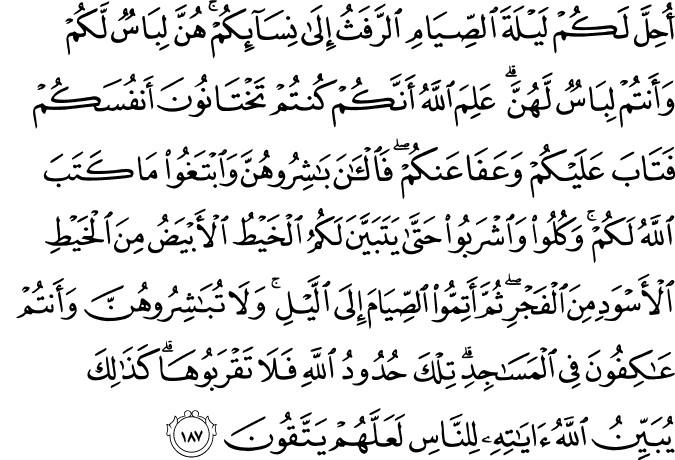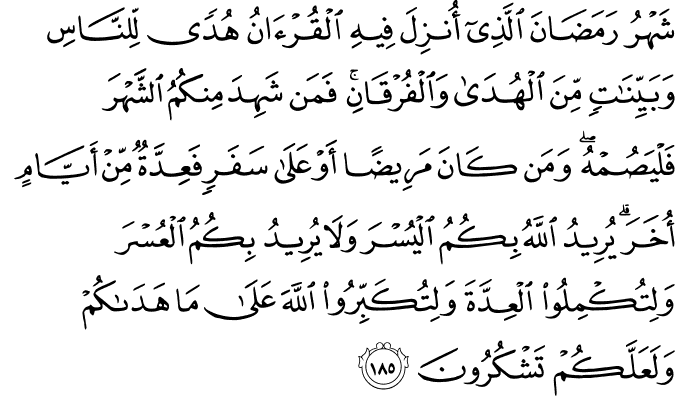Ramadhan is the ninth month in Islamic calendar, a month where Muslims around the world will be fasting. Ramadhan also marked the day of Nuzul Quran or the day Al-Quran was revealed, which fall on 17th Ramadhan every year.
Ramadhan is considered as the holy month and month of absolution. Muslims around the world will take the opportunity of Ramadhan to renew and increase their taqwa (their spiritual connection with Allah) by increasing their religious activities such as performing terawih prayers, reciting Quranic verses, doing charitable acts and seeking repentance from Allah for past sins as well as refraining from doing newer sins.
The obligation to fast during Ramadhan can be found in Surah al-Baqarah: verse 183;
Meaning:
"O you who have believed, decreed upon you is fasting as it was decreed upon those before you that you may become righteous -"
Fasting is the third pillar of Islam and can be defined loosely as abstaining from eating, drinking and engaging in sexual activities during daytime i.e. from dawn till dusk.
Meaning:
"It has been made permissible for
you the night preceding fasting to go to your wives [for sexual
relations]. They are clothing for you and you are clothing for them.
Allah knows that you used to deceive yourselves, so He accepted your
repentance and forgave you. So now, have relations with them and seek
that which Allah has decreed for you. And eat and drink until the white
thread of dawn becomes distinct to you from the black thread [of night].
Then complete the fast until the sunset. And do not have relations with
them as long as you are staying for worship in the mosques. These are
the limits [set by] Allah , so do not approach them. Thus does Allah
make clear His ordinances to the people that they may become righteous." (Al-Baqarah:187)
Before starting the fast, Muslims are recommended to sahur i.e. eating during the small hours of the morning, until the dawn. It is recommended for Sahur to be taken as close as possible to the dawn. However, though a Muslim can eat until dawn i.e. the call of Subuh prayer, however it is Sunnah to stop eating before the call of Subuh prayer i.e. about 10-15 minutes prior (imsa'). The sahur is important to strengthen our bodies to enable us to perform the fast during daytime. When taking sahur, it is important to choose your type of food carefully. Food with high fiber and starch will help you to get through your fasting day easier as these types of food are known to be digested slowly by the body.
Fasting
during Ramadhan is mandatory for all except children who are not yet baligh, old people, those who are
sick and/or frail, people who are travelling, women who are pregnant, nursing
their newborn child or in their menses.
Meaning:
"The month of Ramadhan [is that]
in which was revealed the Qur'an, a guidance for the people and clear
proofs of guidance and criterion. So whoever sights [the new moon of]
the month, let him fast it; and whoever is ill or on a journey - then an
equal number of other days. Allah intends for you ease and does not
intend for you hardship and [wants] for you to complete the period and
to glorify Allah for that [to] which He has guided you; and perhaps you
will be grateful." (Al-Baqarah:185)
The purpose of fasting is not hardship
but spiritual development, teaching perseverance, self-control and
self-discipline. Fasting teaches sympathy for those who are famished, for the poor and the distress. Fasting also has proven medical proprietaries such as weight management, resting the digestive tract, lowering the lipids level, lowering the systolic blood pressure and lowering sugar levels as well cholesterol.
Muslims are recommended to break their fasts with dates or sweet food. The reason for this is to boost the energy level after fasting all day. Sugar is known to contain glucose which energized our bodies.




No comments:
Post a Comment